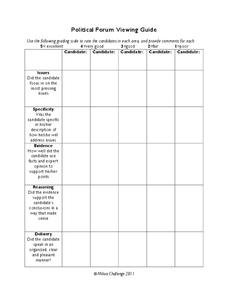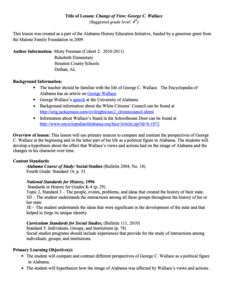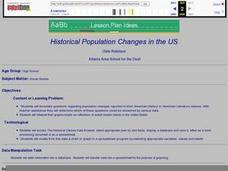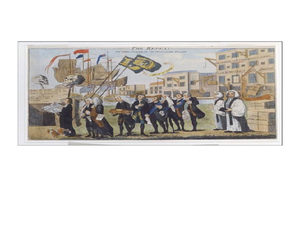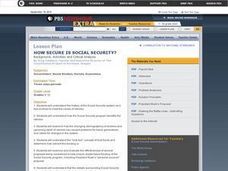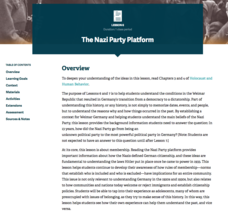Mikva Challenge
Political Forum Viewing Guide
Is there a way to determine a winner of a political debate? Use a helpful rubric to evaluate the issues, specificity, evidence, reasoning, and delivery of candidates in a debate. After assessing each person's performance, high schoolers...
Alabama Department of Archives and History
Change of View: George C. Wallace
Who exactly was George C. Wallace? A great lesson plan provides young historians with a hands-on activity, direct instruction, and discussion to learn about Wallace, why he was an important figure, and why he changed his mind about...
C-SPAN
What Are Ways for Youth to Engage in Politics?
Help young people become excited to participate in politics. High school historians participate in an engaging lesson focused on ways for youth to become involved in government. Scholars review articles, videos, and essential vocabulary...
National Endowment for the Humanities
Cultural Change
High schoolers research the passage of the 19th Amendment as an illustration of the mutual influence between political ideas and cultural attitudes. They also read the Seneca Falls Declaration and explore the cultural shifts it both...
ProCon
Social Media
Facebook, Instagram, Twitter—are they good for society? Pupils prepare for a class debate in which they voice their opinions on the issue. They read the main pro and con arguments, explore others' opinions, view videos, and discover the...
Curated OER
Political Asylum Talk Show
Learners view videos, visit websites, and read about the nature and changes made to the idea of political asylum. Beginning with Jewish refugees fleeing Nazi Germany, they will explore policy change throughout the years. The lesson...
National Endowment for the Humanities
The 1828 Campaign of Andrew Jackson: Changes in Voting Participation
Students give examples to indicate how voting participation changed in the first half of the 19th century, and make connections between changes in voting participation and the results of the election of 1828.
Curated OER
When Art Conveys a Political Message
Twelfth graders learn art is an effective way to convey a political message. They learn how political messages are created to convey a message. They analyze a piece of artwork and then write a short paragraph from the point of view of...
Curated OER
African-American Soldiers After World War I: Had Race Relations Changed?
Students utilize an online database to conduct research and analyze the conditions for African-Americans before and after World War I. They consider the role of the 92nd and 93rd divisions in affecting social change.
Curated OER
Early Voting, Other Election Changes are Possible
Students use the internet and linked sites to explore current voting methods in their community. They research suggestions that have been made for changes and interview people who made these suggestions (when possible). Students suggest...
Curated OER
Writing Prompts: Political Cartoons
Students select a cartoon to present to the class. They study it for a few minutes, write a list of questions about the cartoon. Students answer each others' questions and change the questions to declarative statements which are used as...
Curated OER
Historical Population Changes in the US
Students conduct research on historical population changes in the U.S. They conduct Internet research on the Historical Census Data Browser, create a bar graph and data table using a spreadsheet program, and display and interpret their...
Curated OER
Political Parties
Students engage in a instructional activity that is about the development of political parties in the United States government. They conduct research using a variety of resources. They use some key focus questions to guide the activities...
University of Wisconsin
Analyzing Presidential Campaign Propaganda
Campaign propaganda has evolved from 1952 through the presidential election of 2008. A social studies activity prompts class members to analyze the devices used in ads and political cartoons, noting strategies they believe would work to...
Encyclopedia Britannica
Candidate Flip-Flop or Evolution?
Beware political rhetoric! Connotation is everything! Groups select a presidential candidate and investigate how the candidate's position has changed on a specific issue. After analyzing the situation, the group determines whether they...
Curated OER
Activism and Social Reform in America from 1800-1850
Learners discuss idea of social status, examine antebellum social reform movements, and compare and contrast experiences of activists who sought to improve workers' lives, end slavery, reform immigration laws, and establish voting rights...
Curated OER
A Changing Society: Industrialization and Urbanization
Students participate in activities that teach them about the Gilded Age of industrialization and urbanization. In this social changing lesson plan, students answer questions, watch videos, have discussions, read texts, and more to teach...
Curated OER
The Art of Political Cartoons in Revolutionary America
High schoolers analyze political cartoons. In this colonial America lesson, students examine the provided political cartoons and respond to analytical questions about each of them.
Curated OER
How Secure is Social Security?
Learners explore the Social Security System including its history, benefits, funds, problems, and its future.
Humanities Texas
Primary Source Worksheet: Udo J. Keppler, “Next!”
Standard Oil's stranglehold on the US government is the subject of a 1904 political cartoon. Kids use the questions on the provided worksheet to prompt their analysis of this primary source.
Curated OER
Teacher Notes
Gathering information, distinguishing between arguments, preparing an oral presentation; these skills are fostered as 10th graders explore aspects of global trade and politics. They use the Internet to gather information about NATO, The...
Curated OER
The Changing Role of Women
Eleventh graders examine the evolution of women's rights in America. As they analyze primary documents and discuss historical events, learners determine how Abigail Adams, Eleanor Roosevelt, Lady Bird Johnson, Margaret Sanger, and James...
Facing History and Ourselves
The Nazi Party Platform
Not all party platforms stay democratic. A resource covers many political issues in Germany during the time of World War II, and teaches pupils about the Nazi party platform and what went wrong. Individuals participate in a warm-up...
Curated OER
Early Presidents
Students are introduced to the lives and contributions of the first seven presidents of the United States. They, in groups, conduct further research on one of these president and his political platform and design a presentation for the...


